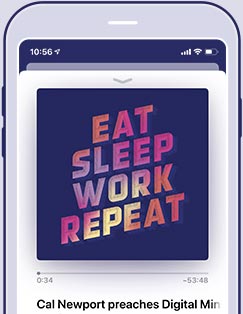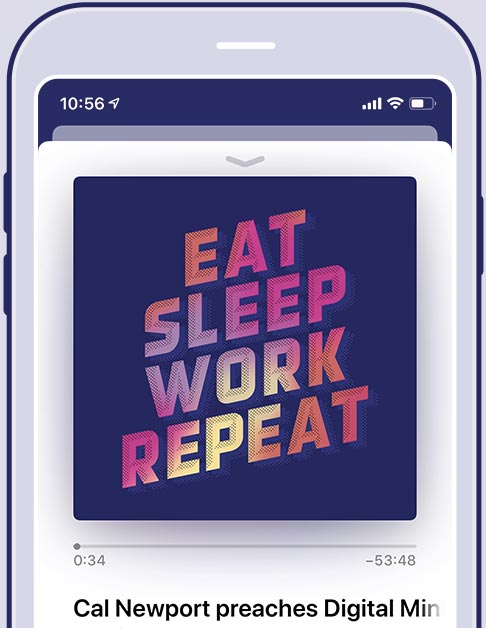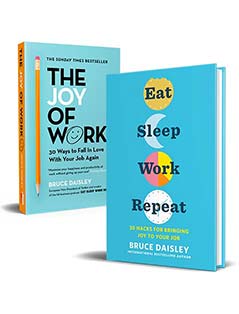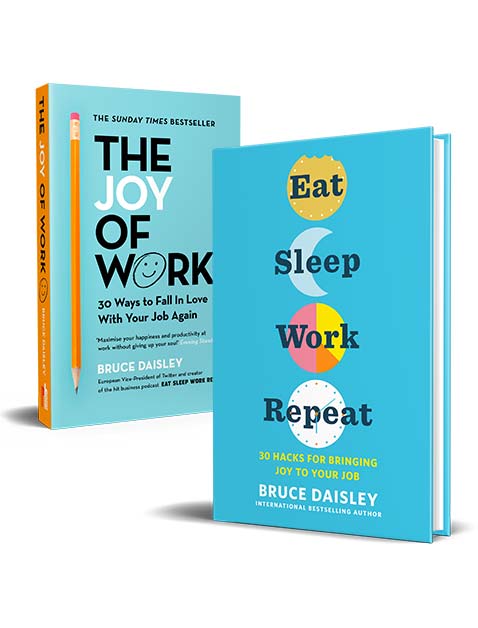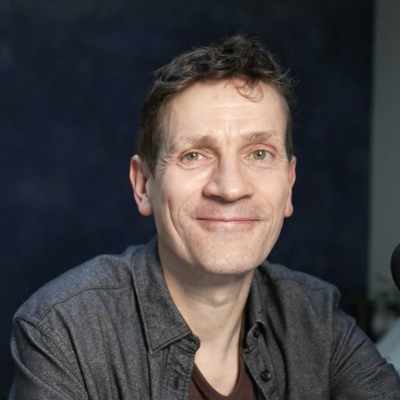The Culture of Teams
Mark De Rond is an ethnographer who embeds himself with teams under pressure. What’s the culture like in a field hospital in Camp Bastion, in the boat race crew? Mark’s latest book ‘Doctors at War’ – a first hand account of the culture in Camp Bastion’s hospital – is out this week.
I was fascinated with all of your work. I think it may be worth kicking off with an explanation of what actually is an ethnographer?
MARK DE ROND: So ethnography literally means the written text about a particular culture. We use it nowadays to refer to a method – a method comes from social anthropolology. It’s the probably one of the oldest ways of studying people, certainly one of the most old fashioned ways of studying people by living with them full time. That’s what ethnographers do. I study people by living with them full time for a pretty long periods of time, often under very similar conditions that they do. The downside is that I work a sample of one which means I can’t generalise from them. The upside is that you get to see a level of granularity – of detail – that you don’t normally see. And that’s very addictive. So I’d never go back and do anything else.
BRUCE: And so I mean it must be interesting. But let’s go through a couple of the teams that you’ve been embedded with. And is it always the study of teams?
MARK DE ROND: it’s always been a study of people working together usually in difficult circumstances. The work did with live scientists was interesting because the attrition rate is high. As a scientist it’s very unlikely that you’ll be you’ll be credited with discovering a molecule that makes it into a drug. The work with sports teams was interesting because they work in a very competitive environment. You’ve got 40 rowers all competing for only eight seats in the boat. The work in the Amazon was interesting because the risk of piracy is very high. So there’s a real risk to life involved. The work that I’ve done with comedians – improv comedians – is interesting because they go through these long spells without sleeping. It allows us to study how you how teams work together how people collaborate in when they get very tired workers. Work with military surgeons is interesting because they are in an environment which is at once emotionally difficult and just generally very very high pressure So the common denominator in all my work is that I look at people working together. Mostly it’s teams but it doesn’t have to be the case but in difficult circumstances. So what happens when you get into a difficult place, and you have no option but to succeed by collaborating or coordinating with people very much like yourself.
BRUCE: So let’s look at one of those teams, you wrote a fascinating book about the Cambridge boat race team. There’s a number of things that really stand out from it. Probably the first one that was most intriguing from an outsider’s perspective is the fact that you start off with as many as 40 people here. But you get down to eight. But those eight are not the fastest eight rowers are they?
MARK DE ROND: Not necessarily. At that makes coaching difficult. How do you select from 40 people? How do you select the right combination of eight people that will collectively make for a very fast boat. And that sometimes involves a trade-off between technical competence and social competence. In the 2007 crew for example we had someone who everyone knew not to be the best oarsman. The performance data showed it so we seat row people. We put them on rowing machines. You kind of know how powerful they are and how effective they are in a crew. Five of the returning Blues who have rowed the year before had again been selected, they fought to have him in the boat. The argument was that he may not be the best rower but there’s something about him that allows us to dig deeper and be more effective collectively. So the coach at a time had to do something quite difficult which is to move someone out was objectively more skilled and stronger. And to move someone in place who by any objective standard wouldn’t be. The explanation they gave in part was that there’s something about him that allows us to tackle conflicts more effectively or kind of helps take the rough edges off of some of the people we have in the boat. That boat was very stacked. We had an Olympic gold medallist, someone who went on to win two Olympic gold medals, we had two reigning world champions. So they’re good people. But again what makes them good makes them difficult which is true of many walks of life.
There’s an interesting insight through that. You use the word ‘exploitative’ at one stage. There’s people playing mind games with each other. People trying to demonstrate to the coaches, to the selectors, that they’re better but they’re not trying to let on to the other potential team-mates that they’re working harder or that they’re doing these things. I think about a recession to procure if that’s okay. Yeah. Thinking about my response to your call.
What comes of the boat race team is that teamwork seems to be a combination of competition and collaboration.
Absolutely. And you know what rowing has systematised that. In order for you as a role to look good in front of the coaches and to optimize your choice of selection you effectively in the boat have to create a space for everyone around you can be the best they can be because if they’re good then they’ll make you fast in the process. The irony is that sometimes the people that you you need to make as good as they can be are very sick if you’re competing with for a seat and about the general level of paranoia which is in some ways quite unique very powerful. It’s no surprise that people play games you know. These are smart calculating individuals. But they did have a pretty Roughrider fit right. When we when we seat race rowers which is a way to try and find out how quick roadsign and assured as life people what we do is we typically line up to force and force a race that 50 meters.
The coaches will will no donder time in some typically one cruel be maybe a second or two showed another crew.
Well of course you then do is is interesting. They ask for one person from one crew to make a direct swap with his or her opposite number another crew in then roadable expected to start and rearrange them and then again a cold finishing times. You’ll do this a few times right. And what it means for use a roller is that if I want to look good I need to make sure that my people in my boat actually are can be as fast as the best they can be because they make me look fast. That means it has to change and other people you’re racing against. You’ve got to make these people fast as fast as you can against the people that previously were you and your mates right in your group. So it’s been systematise in rowing and it’s again it’s it generates a great deal of discomfort. But actually it’s a very very good way of selecting our people and how people functionally in a real and a life critical evidence.
You mention in your writing that often sport is like this not easy. It is like you mentioned it’s often sort of a lazy metaphore there it is at least a sort of a list of things that put. These things you do by hit you think they are directly applicable to the world of war. Because competition between members of a company might exist it’s always so hidden under the surface. Do you think sport just magnifies what exists in other invitees.
I think it’s partly sport stars right. It’s these sort of tensions you see with in sports particularly wanted to refer to right now. The team competition corpore She also seemed working life but a much more subtle and doesn’t mean it doesn’t portend. We need to be careful though because sports head has at least two features which you don’t always find working like one is that in sports particularly sports you can cherry pick in a way you can’t work in a working environment record often working environment. The people we work with even the teams we lead are people that we inherit know. Also in sports there’s a rhythm to life that you have echoes off in the working world. But in sports you typically have one event a year or one off and every four years or something like that you go and work towards a sort of almost primed to do it in a working life. There might be rhythms in terms of quarters gone by and so on. It doesn’t necessarily have the clarity of purpose right. And it kind of never really surprised me so we go to organizations that should know what they’re about actually performing quite well. We asked people to talk about what I think they are here to do as an organization. And the discussion at its use can be very very powerful. It’s something people often like to talk about birds were as you might expect a real sense of clarity you know from some of the organizations certainly I’ve worked with that often doesn’t exist you know in this particular true or off diversified forums.
[00:10:02] It’s a it’s a great way of sucking energy into a room by just getting to sit down and simply what you think we need to do and why you know God forbid if we were to be stripped out of the world’s naked hooker you know ask a lawyer.
[00:10:14] This case it’s not easy to answer questions questions like there’s a there’s a wonderful example of this. Right.
[00:10:23] Right so in Cambridge we have something called the Stephen’s question now known as binary. Like many sports you win or lose. And the boat came which is absolutely clear upon its opponents its purpose which is to be auctioned of rates no matter how many races you win if you lose the boat for 60 years or waste of time no matter how many races you lose that’s okay. Long as you win the boat race. And because there were others by the way you can get away with a single criterion they use to make decisions called Steven’s question. No and the question is will me doing this today. Well as long as they help us win about race yes we know the answer is yes you do it if the answer is no you don’t. But tents are not in question said it interesting life history. All right so the question you now hear more often is a question that that originated with he did the Great Britain crew did one called in Sydney in the Olympics in 2000 which is are you doing this today. What is the news today. Will it help make the bulk of fast. Yes from now organizations it’s not easy to find about the boder to use their purpose. You have to do what she could do. No one would notice. What becomes interesting is to try and see if you could formulate for yourself something like Stephen’s question equivalent. So for a law firm like slot which may or now all equivalent to your will as doing this make the ball go fast yes or no.
[00:11:44] Now we’ve had organizations here that have tried to sort out what they find out as interesting. What matters is not really the question at the end the equivalent of Stephen’s question but the process should begin is to give people the talk of a purpose. What people are here to do and that’s the question is often far more complex. In a particularly diverse organisations we saw might be right but it’s something you feel you must get your head around. So difference different sportsmen in the workplace is some some big differences particularly along those two rounds. But sport is nice I think particularly because it helps amplify some of the stuff that you either you see or you should see in the workplace.
[00:12:27] So we need to be careful not to throw the baby out with the bathwater and can argue well I love those types of life where you find the cut and pull back and some of the thing I loved was that you posted audio of the cocks and what their cocks were saying all those things. We watch a race you think. What’s that. What’s the person who’s sitting there doing nothing I say. And actually it was fascinating to listen to because it’s it fully demystifies it. The coxs Largely injecting a bit of energy come on come on. Occasionally do a bit of pace. It’s quite hard as they can be.
[00:13:03] And I was just interested in how important do you think that leader is in that environment it can be he can be hugely important so the example that I know about strides in 2007 again. Did the Kings go ahead a quarter. Becker dowbiggin and she made a number of course in a race that in some ways became her legacy not one of them or some very banal or maybe even sound terms or patronizing but someone midway through the race as she started to get in Oxford she says good boys good boy.
[00:13:33] And we talked in Roche today. This is all they remember for. Now here’s the story. She wasn’t meant to be in a boat at all in the boat was meant to be an American called rossland. Really nice going. The difficulty with the US is that he was very very aggressive and it would make the guys nervous no bolt rowing boat speed depends upon not just power but it depends upon coordination right. It’s really critical that you get a bleed in at the same time. The power on the same time to bleed out at the same time. Even if you were harbury on your own will you lose coordination. You will slow down. Now it’s very hard to quit and made me nervous. Now the real difficulty is though everyone knew he made me nervous. No one talked about it until 11 this was about race. They lost the fixture a mock race against monsey and had a very bad time of it. Then on the way back to where they were camping out two of the guys started to talk or talked about or stir their cocks something wasn’t right. They couldn’t find a rhythm in rowing. He made me nervous and so they called a meeting that night. You know without a chronicity present and finally opened up a Come to find out without fail everyone felt very very similarly about the coxswain but it never showed his private reservations because the team spirit of team spirit felt or so. So French out there no one wanted to stick our neck in. Destroy whatever team spirit did spend so much time building up.
[00:15:01] There and it’s quite dramatic. They embodied him to the reserve group and put it back in place now. He had already won the boat race twice with the reserve crowd. There was every chance he was going to be a coxswain. Rebecca had never crossed the border it’s fun but it’s more like a stretch but it was something she could do he can do just to keep calm. I know Rebecca quite well. At a point in a boat race where they are behind rocks and because they had a bad start she didn’t know what to do. But only thing she did know is that she needs to find some courts to keep their heads in water and need to be very very technical. More about Oxford in some course than can something to feel good about that we’re allowed to find collectively to find the rhythm and that’s what we think of it. So again you know we talk to the guys today. It’s the good boys. The way they do it. Oh okay.
[00:15:51] From the time they did the following year the Oxford cocksure used That’s a guy was was very curious. They did. When did you know that it’s not a court.
[00:16:10] You know it’s not the call that would have won the race. The cost to symbolized what this fragile crew was about it was a crew of very very high performing individuals but socially fragile five of them are all a year before and lost the race. Nobody should have won on paper a far stronger. They were very very insecure guys very powerful but socially not the school he wanted to be so on a different sort of team and one that I’m sure is more for mockery.
[00:16:38] So you talked and you spent some time embedded in Camp Bastion in Afghanistan which seems remarkable. I mean the numbers that you talked about watched 174 casualties come in just one week. Yes it’s dead on arrival. Then you watched 134 hours of operation and it was interesting because when you were describing the scene and when you were describing your experience what the team dynamic was like. You know I was trying to sort of visualize it and use the word that was really surprising. You said it was a sort of humour to their whole culture in a dark humour. Do you talk about what that team dynamic was like. Sure.
[00:17:22] So the figures you just mentioned those are relevant only to the first three covers there right. So it was there for six weeks and six weeks. Is it tour of duty typically for surgeons and is this.
[00:17:35] The use of humour in hospitals is in some ways quite well known. There’s a well-known book called House of God written under a pseudonym in the 70s or 80s, which will be very well known by medical trainees. What the book does among other things is just to give life to the training of a doctor. And part of that is the exposure to humour. The humour was very dark, it’s very black. It’s the kind of humour you would typically not share outside of hospital. It’s kind of an insider game, you don’t play or share with outsiders. And quite often the humour is at the expense of the people that in ordinary hospitals shouldn’t have been there. They’re still alive and it shouldn’t be your right or people that suffer from lifestyle diseases that could have been prevented had to take better care of themselves and invest than you might find you were like a target. Afghans who shot themselves in the foot you know to escape a dreadful situation or were accidentally shot the other you know something like that. It may seem grossly unfair but I think it’s just one of the coping mechanisms they inherited from the work in the NHS. That just allows them to kind of get on with the job, something that really surprised me though by that tour of duty and it’s the following. The people that deploy are generally very senior staff almost all consultants. Many of them were deployed to war many many times to some of the worst abortion or else you’d think of Bosnia.
[00:19:06] So it should be pretty hard and also pretty tough. People who are often quite opinionated and this is especially true of the general surgeon general surgeons are in some ways quite old fashion to take care of the threat securing the belly or the big organs because there’s such a big risks but orthopedic surgeons are plastic surgeons for example wouldn’t take it so by self selection These are pretty tough people. Now none of that matters when they get busy.
[00:19:30] So when you get busy on a casualty You know the teamwork you then see is second to none. It’s really stunning to watch people just get on the job and really effective.
[00:19:41] And of course that’s partly because because they’ve been well trained but it’s also partly because the objective is so very very clear. You know Sean will die if you don’t do something very quickly. Now the flipside of that is that it’s it’s sometimes very busy but it’s not always easy. So sometimes days go by and very little happens. And of course it leaves these d d big personalities with nothing to do. So what I do is they start a whole new water to come in feel guilty about this because I mean you must get injured for them to have something to do. They started lupita’s speaking to Cedar from non-emergency operations which potentially puts patients at risk. They start to interfere with each other’s work which is a big node or a medicine something you just don’t do. And it’s interesting they become sensually bored bored not just because they have nothing to do but bored because they realized that too little of what they do is meaningful. Right. So the Afghans for example their product will have to be passed on to local hospitals as soon as it’s considered safe to do so. The doctors are well aware that their chances of recovery or even survival are often greatly compromised. In doing so they have relatively little choice in the matter. So they realize that in fact even when they are busy not all of what they do it’s meaningful. Nothing has a very interesting translation to working life. You know a lot of work at professional service firms. I get to work with the people there are usually pretty smart usually really BPC.
[00:21:18] In so boredom in the ordinary sense. It’s not really an issue. But most people I dare say are. At least for some time essentially. You know people like you and I that are our board because we realize that actually probably too little of what we do is meaningful. And it’s interesting because if that’s true it will be tough to be. You lead in it raises a very high profile question right so what is going to be your role as someone leading a team in helping people work work around or manage their extension. What am I supposed to do a workload in a general sense then. Well if I raise that issue again particularly with professional service firms dealing with doctorates it’s something they absolutely recognize. Even doctors in the NHS you know people that think you know we’d be envious of off because after all they’ve got skills that are second to none and they literally save lives. Quite often they’ll be complaining but affected too many of the people that they see suffer diseases that are preventable. So you know yeah it’s a serious attention boredom I think saw the courtesy of the workplace today.
[00:22:26] Yeah.
[00:22:28] That’s not the motivation that actually crosses both of the graphy you mentioned so with he became its rose and with the surgeons the military surgeons actually scanned for a reference for all the work on the field with comedians and with life scientists from out in the Amazon.
[00:22:47] It’s the idea that’s the operation I should say that for all the good teams bring to organizations thereby like the easy places to be. Right and I believe that’s absolutely true. When you look at teams even very high performance teams you probably would you look inside what you see inside can often look quite messy surprisingly messy. And the question raises is well how come the functional often feels dysfunctional. A lot of my research for the past 15 years has been kind of around that one and it shouldn’t surprise that things feel this in teams because you’re dealing with very high performers who bring to teams everything that’s dysfunctional about them you know. Just like you and I do you know we bring to our teams to our workplaces our insecurities our ambitions our pins so likes or dislikes and so on. We also know that people that lead teams can make a really positive difference in teams they lead. And so what I what I propose and what I’d like to propose and quite often do with the audiences I work with is that. You and I can make a positive difference to the people we lead by working a number of questions really well made. And I think all of these questions they’re probably about seven or so I think are relevant to almost every team no matter where they are what we do and the way you work these questions with your team. Will depend on what we have.
[00:24:05] But like I think it’s right so if you’ve got you know two kids three kids you get a lot worse of one kid just kind of doesn’t work with a kid. That’s certainly the case for my family right. But the big questions in life were always the same about universes. My boyfriends girlfriends and teams are like that. I think the big question is city life very very similar. How do you handle them and them you work for them will depend upon what you have tried. These questions have to do with things like purpose you know things like psychological safety you know how you know people tell you where you need to now and what could you do. And things like harmony right or happiness in the workplace your house that relieves the points and the assumption often being there to help you we are a little perform bressant Felt if you look at the empirical evidence it suggests something that’s almost the opposite. You know quite often when people feel in harmony it’s not a cause for performance but a result of having performed. So the first responsibility of people like you now is with performance I suppose happiness questions off sites you know how big is too big is there a sweet spot for teams you know. And what does that depend upon questions of how to deal with difficult people and teams of people that you need you need it because they’re good but what makes them good mix and difficult. How do you how do you exploit good and mitigate risk off of these very same behaviours. So these questions again as someone you know leading a team these are questions you all want to work in a ways of working them and if you’re working well they’ll be empowering. If you don’t work for them they won’t go away.
[00:25:33] They’re endemic to life. And so that’s kind of what my work is. Has always been about. So teams of teams skin be very good. But I’m not sure they’re very happy place for much of the time. It doesn’t mean another effect when they are affected in when they perform very well at least temporarily that can create a really good sense of harmony and happiness togetherness and identity which is mostly from life from work.
[00:26:05] You mentioned in one of two things just on that point that orchestras that unhappy orchestras have a comfortable dynamic between them. National Guard is better orchestras right. I think that properly.
[00:26:20] Well actually it’s not that bad. Right so there’s a piece of work done by the late Richard Hackman who was a psychologist at Harvard and he’s probably on teams one of the formal scholars.
[00:26:33] Right until he died. So he looked at a 78 Symphony Orchestra out of four European countries some years ago. And one of the things that he observed is that grumping orchestras almost always upfront have your Astraweb. So as the crompton’s price performance now we expect the people who kind of understand what a grampians comes from this. It’s kind of politically incorrect right because people were grumpy because the women were introduced to symphony orchestras. No. But but if you scratch your way you’ll find a lot more research like it and that research is interesting because a lot of suggests quite often is that we do often tend to think that Harmony generates performance. And I’m sure there’ll be some anecdotal evidence for that. But a lot of the evidence suggests is again that if he get performance rights they’re not always but more often than not. Harmony will follow and that put a sort of a an objective I think that’s.
[00:27:32] That’s right. So if you want harmony your shortcut to harmony is not a conversation it’s to get forward to it right. Make sure that people know what they’re here to do and how to perform their mission and times in very nicely. It is some work done by equally hard for 20 mins. So be late. She’s she’s really good what she does and. So she did something very interesting. So she invited 230 people like you and me to keep a diary for three months. And in a diary we would write about every day at the end of a day no matter how busy that day had been we’d say something about that day. Was it a good day or a bad day and why you. And what made us happy were just angry and so on general with just over 12000 pages to find out at the end of three months period. There is one thing in model you will have you know more than anything else. It is our ability to make progress. Not just progress in general process something we think is important. Now I know your interest in the happy place constrained. I dare say that’s what constitutes a healthy workplace. Part is probably the ability of people in the workplace to be interested in terms of what value what it ought to tell you to be allowed to make some progress toward something that they themselves think is important that a thing breeds loyalty and that I think is especially true or high performance. We just want to get better at something.
[00:28:53] And by the way it’s also what worries me a little bit about the movement to train and put forward a policy of a minimum wage being paid to just this one around the world to me. I kind of use it because of basic income. You know in Kenya you should find a way you like and some people might envision getting getting a payment and not having to work for it.
[00:29:11] I think maybe this is the idea that everyone received a lump sum. Exactly. Rather than a national minimum wage.
[00:29:18] Yeah I think it’s still choose to work and it’s very obvious. But some people have you know come after the woodwork and saying this is a great idea because it would dismiss some of their families and to not work. You know if they can if they can survive what will it cost to get. What worries me I think to some extent is that in fact a lot of us think the place we get from life you know is is just a feeling of being productive you know. Now you can be productive at work but it’s not always easy to measure. Productive at home predictors did work it’s a little bit easier to get a hold of it since we’re making progress to be productive to do something that’s valuable. Maybe not in an ultimate sense but at least in some ways you can get your head around. How did you measure trade I think is actually really quite important right now. I just can’t imagine not working because.
[00:30:14] You know a lot of working but just because I think we all need to have a say. Do we do something that’s important and something we can measure progress against right to progress or I should say sorry that’s a bit of a detour.
[00:30:29] Yeah. Maybe one of the early final thing quite corrupt was the human in the environment. It was all of you in the boat race team. There was actually humour like Harmony just an output of a successful team.
[00:30:50] It’s easier.
[00:30:52] Is it easier to engage in humour when people feel a bit more relaxed. I do so you know once they’ve performed well. But it’s also very nice to break tension right. Some shit and Schumer has to be an output of performance. You know I do think of your plays a critical role I think it kind of humour in a boat race crews would have been different from a human in a hospital behind in a hospital I think it’s a coping strategy. It may be true to some extent off of sports as well but it’s you know I’m not sure but I can tell you that the. Person they selected into the 2000 crew thought he wasn’t the best was absolutely absolutely hilarious. It’s very very funny. I shared a story once with an Irishman in this city not an island of something similar in farming you know. This is what we do with race horses as race horses are very nervous animals so when race horse horses are nervous you know we do know sort of all. We put a donkey with them and it’s great because a donkey is a sole authority Excel laid back kind of comes the horses down.
[00:31:58] That whether he likes it or not. He was kind of daunting for the crew you know and he was well aware of that. He would sometimes tell me before and he said you know what I want to feel like playing a clown today but it’s difficult to do. Now that doesn’t mean he wasn’t a good roads very good road very good also. And the margins are very very small. But it was something you brought in a crew that just allowed him to take the edge off a little bit. I didn’t mean it all along all of the time. You know at the surface there were still lots of tensions but he was just able to kind of nipped in the bud. You need to ride it provide a sense of identity around your crew as well as a sense of light hearted. So I think that that just kind of helped the movie.
[00:32:39] It was interesting you mentioned two things there which have been the Cox who helps relieve tension and then him who helped. So that has humour and it seems like when you’ve got highly demanding environments some pressure release something that helps keep a sense of balance of proportions seems to be a valuable contribution.
[00:32:59] It absolutely can be know you know in most people this pause will recognize individuals like us in the workplace. You know these are individuals that are not grossly incompetent. You wouldn’t have them around you wouldn’t tolerate them. But something about it just kind of know when to release the pressure. You know and these people are very very valuable to have.
[00:33:25] Great faith. Anything else that wants to cover it. They say it kind of went off just right. That’s fantastic. Is there anything else that you think I mean I have got the well talked about the court people which is fascinating with boredom a little bit off the top of us. So what you get an embassy.
[00:33:45] You know you can help. You actually have got nine months next year to dedicate new of projects and have a long list of stuff that I would love to do.
[00:33:53] But getting exis is quite difficult right so I mean look out for the community to join a community of people that work in an area that is maybe slightly unusual or certainly difficult to remain where it is.
[00:34:08] I don’t mind at all what level of discomfort you would need to be part of that.
[00:34:16] But lauffer some to help me out and say you know here’s a group you can just tell me when you come and join us. I’ll be fine. Yeah. So it’s hard it’s always hard






